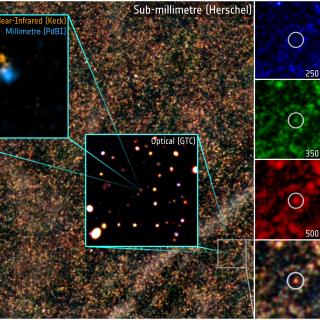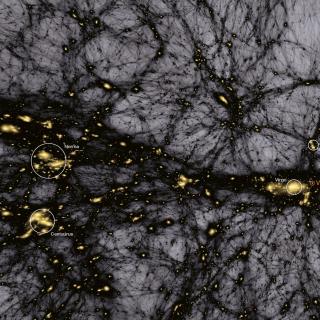Bibcode
Kauffmann, Guinevere; Jordan, Wendell P.; Jordan, Beatrice; Huehnerhoff, Joe; Honscheid, Klaus; Holder, Diana; Hogg, David W.; Ho, Shirley; Harris, David W.; Harris, Ben; Hall, Patrick B.; Hamilton, Jean-Christophe; Haggard, Daryl; Guo, Hong; Gunn, James E.; Génova-Santos, R.; Font-Ribera, Andreu; Finley, Hayley; Filiz Ak, N.; Fan, Xiaohui; Escoffier, S.; Eisenstein, Daniel J.; Ebelke, Garrett L.; Ealet, Anne; Dhital, Saurav; de Putter, Roland; Delubac, Timothée; Davenport, James R. A.; da Costa, Luiz N.; Cuesta, Antonio J.; Croft, Rupert A. C.; Cope, Frances; Connolly, Natalia; Comparat, Johan; Chen, Yanmei; Carr, Michael A.; Carnero, Aurelio R.; Carithers, William; Busca, N. G.; Bundy, Kevin; Brownstein, Joel R.; Brown, Peter J.; Brinkmann, Jon; Brewington, Howard; Brandt, W. N.; Bovy, Jo; Borde, Arnaud; Bolton, Adam S.; Blomqvist, Michael; Blanton, Michael R.; Blake, Cullen H.; Bizyaev, Dmitry; Bhardwaj, Vaishali; Berlind, Andreas A.; Beifiori, Alessandra; Bautista, Julian E.; Barkhouser, Robert H.; Bailey, Stephen; Aubourg, Éric; Anderson, Scott F.; Ahn, Christopher P.; Schlegel, David J.; Dawson, Kyle S.; Zheng, Zheng; Zhao, Gong-Bo; Zehavi, Idit; Yeche, Christophe; Wood-Vasey, W. M.; White, Martin; West, Andrew A.; Weiner, Benjamin J.; Weinberg, David H.; Tojeiro, Rita; Tinker, Jeremy L.; Thomas, Daniel; Tanaka, Masayuki; Tal, Tomer; Swanson, Molly E. C.; Suzuki, Nao; Steele, Oliver; Strauss, Michael A.; Streblyanska, A.; Weaver, Benjamin A.; Watson, Mike; Wake, David A.; Viel, Matteo; Verde, Licia; Vargas Magaña, M.; Tremonti, Christy A.; Stauffer, Fritz; Snedden, Stephanie A.; Ross, Nicholas P.; Ross, Ashley J.; Roe, Natalie A.; Sheldon, Erin; Smee, Stephen A.; Slosar, Anže; Shu, Yiping; Shen, Yue; Shelden, Alaina et al.
Referencia bibliográfica
The Astronomical Journal, Volume 145, Issue 1, article id. 10, 41 pp. (2013).
Fecha de publicación:
1
2013
Número de citas
1000
Número de citas referidas
948
Descripción
The Baryon Oscillation Spectroscopic Survey (BOSS) is designed to
measure the scale of baryon acoustic oscillations (BAO) in the
clustering of matter over a larger volume than the combined efforts of
all previous spectroscopic surveys of large-scale structure. BOSS uses
1.5 million luminous galaxies as faint as i = 19.9 over 10,000
deg2 to measure BAO to redshifts z < 0.7. Observations of
neutral hydrogen in the Lyα forest in more than 150,000 quasar
spectra (g < 22) will constrain BAO over the redshift range 2.15 <
z < 3.5. Early results from BOSS include the first detection of the
large-scale three-dimensional clustering of the Lyα forest and a
strong detection from the Data Release 9 data set of the BAO in the
clustering of massive galaxies at an effective redshift z = 0.57. We
project that BOSS will yield measurements of the angular diameter
distance dA to an accuracy of 1.0% at redshifts z = 0.3 and z
= 0.57 and measurements of H(z) to 1.8% and 1.7% at the same redshifts.
Forecasts for Lyα forest constraints predict a measurement of an
overall dilation factor that scales the highly degenerate DA
(z) and H -1(z) parameters to an accuracy of 1.9% at z
~ 2.5 when the survey is complete. Here, we provide an overview of the
selection of spectroscopic targets, planning of observations, and
analysis of data and data quality of BOSS.
Proyectos relacionados

Formación y Evolución de Galaxias: Observaciones Infrarrojas y en otras Longitudes de Onda
Este grupo desarrolla varios proyectos extragalácticos en diferentes rangos del espectro electromagnético utilizando satélites y telescopios en tierra para estudiar la evolución cosmológica de las galaxias y el origen de la actividad nuclear en galaxias activas. En el aspecto instrumental, el grupo forma parte del consorcio internacional que ha
Ismael
Pérez Fournon

Cosmología con Trazadores de la Estructura a Gran Escala del Universo
El Fondo Cósmico de Microondas (FCM) contiene la información estadística de las semillas primigenias que han dado lugar a la formación de todas las estructuras en el Universo. Su contrapartida natural en el Universo local es la distribución de las galaxias que surgen como resultado del crecimiento gravitatorio de aquellas fluctuaciones de densidad
FRANCISCO SHU
KITAURA JOYANES